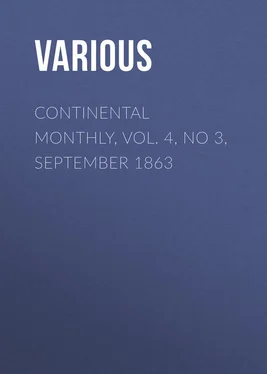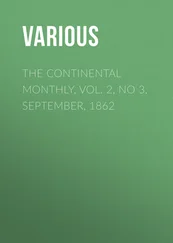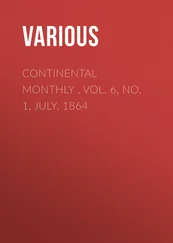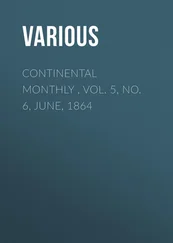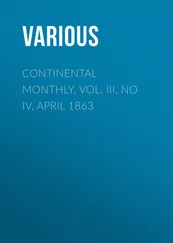Various - Continental Monthly, Vol. 4, No 3, September 1863
Здесь есть возможность читать онлайн «Various - Continental Monthly, Vol. 4, No 3, September 1863» — ознакомительный отрывок электронной книги совершенно бесплатно, а после прочтения отрывка купить полную версию. В некоторых случаях можно слушать аудио, скачать через торрент в формате fb2 и присутствует краткое содержание. Жанр: periodic, Языкознание, periodic, foreign_edu, на английском языке. Описание произведения, (предисловие) а так же отзывы посетителей доступны на портале библиотеки ЛибКат.
- Название:Continental Monthly, Vol. 4, No 3, September 1863
- Автор:
- Жанр:
- Год:неизвестен
- ISBN:нет данных
- Рейтинг книги:3 / 5. Голосов: 1
-
Избранное:Добавить в избранное
- Отзывы:
-
Ваша оценка:
- 60
- 1
- 2
- 3
- 4
- 5
Continental Monthly, Vol. 4, No 3, September 1863: краткое содержание, описание и аннотация
Предлагаем к чтению аннотацию, описание, краткое содержание или предисловие (зависит от того, что написал сам автор книги «Continental Monthly, Vol. 4, No 3, September 1863»). Если вы не нашли необходимую информацию о книге — напишите в комментариях, мы постараемся отыскать её.
Continental Monthly, Vol. 4, No 3, September 1863 — читать онлайн ознакомительный отрывок
Ниже представлен текст книги, разбитый по страницам. Система сохранения места последней прочитанной страницы, позволяет с удобством читать онлайн бесплатно книгу «Continental Monthly, Vol. 4, No 3, September 1863», без необходимости каждый раз заново искать на чём Вы остановились. Поставьте закладку, и сможете в любой момент перейти на страницу, на которой закончили чтение.
Интервал:
Закладка:
Various
Continental Monthly, Vol. 4, No 3, September 1863 / Devoted to Literature and National Policy
SOUTHERN HATE OF NEW ENGLAND
In these days of strange and startling events, of rapid and fundamental changes, of curious and unexpected developments; these days, tremulous with the vibrations of the political atmosphere, and quaking with the fierce earthquake of national war; these days, that are filling up a web of history with more fearful rapidity, more complete, important, and decisive results than any previous epoch in the world's annals, – a history which, if ever truly and worthily penned, will demand a deeper search into moral causes and effects, a closer scrutiny of the philosophy of mind, and a more careful balancing of political judgments, than any drama ever before played on the great world's stage, – in such days as these, I say, it is curious and profitable to subject each new moral phase that presents itself to a rigid analysis, and trace every effect, moral, political, governmental, or popular, to the cause or causes that may, after a fair showing, appear to have produced it. A fair and dispassionate application of true and just principles is as essential to a right political judgment as to a correct moral decision, and he who allows himself to be led by passion, selfishness, prejudice, or a blind adoration of party, instead of the calm convictions of educated reason and conscience, thereby dishonors himself, and abdicates the right he possesses of acting for the best interests of himself and all. Especially is this true under a democratic form of government – where every citizen is a legislator, virtually, – where opinion leads to political action, and is consequently responsible for the course that action may take, and where each one helps to swell the numbers of those great parties that in their plannings and counterplannings make or mar the general good fortune. If this is true of individual citizens, how much more is it true of those mighty engines of the press and of party, that sweep such grand circles of influence, and install, in grandeur or in gloom, such important national conditions. That these are fruitful of evil as well as of good, every great national struggle, every crisis in the affairs of nations and of humanity, bears witness. Every national contest has seen the rise and the fall of an anti-war party, and felt the influence of a press wielded in the interest of that party. These have not, necessarily, always been in the wrong. The contrary has been often true, though their fall, and the opprobrium cast upon them have been none the less sure. It is only when these have arisen during the progress of a war involving great moral and humanitarian principles in its successful prosecution, that the whole force of such an opposing influence is felt, the whole evil apparent. No cause however just, no war however holy, no trust however high and honorable, but has met the violence of this evil opposition, and the danger of betrayal from this source. Not while men possess the greed of power, place, and gold; not while reason is held in abeyance to passion, is freedom safe without a guardian, or the liberties of mankind able to abide without 'eternal vigilance.' Even our national war, the grandest and holiest of time, both in its purposes and results, is only the last most mournful illustration of this fact. When these contemporaneous judgments, true or untrue, as they shall prove, now in the heat of the time evolved in the thoughts of those who do think, and becoming crystallized in the countless newspapers and periodicals which deluge our land, and in the party records of the hour, come to be thoroughly sifted, and the sure and impartial verdict made up to pass into 'the golden urn of history,' without appeal thenceforth, great will be the glory or the shame of the prominent actors in the drama now enacting before the eyes of the world.
What is the spectacle that our astonished eyes behold? The Genius of Liberty, standing on the threshold of her besieged temple, pale, fettered, betrayed in the house of her very friends, but resolute and dauntless as ever, her eye calm and steadfast, her hand firmly grasping the Magna Charta of our birthright, and the birthright of all the race. While a raging and vindictive foe bays her in front, and the leal and true are pressing in countless hosts around her at her call, a false and craven crew are basely creeping in at undefended passages, and, with lies and slanders and deceitful tongues, endeavoring to undermine the foundations of her strength. Base sappers and miners! Thank God ye are few! And the number of the people ye are trying to hoodwink and seduce from their allegiance is hourly growing less, as your cunningly devised schemes explode. Do ye not know that the people of the Free States are loyal to the core? That great principles are invincible as fate, say rather, Providence? and that those who will not move in their onward course must be overwhelmed beneath the wheels of their triumphal chariot? Do ye not fear the award of posterity? Let the partisan press of to-day, and those who inspirit and sustain it here at the North, who are vainly and impotently trying to turn back the tide of human progress by aiding and abetting the vilest rebellion against a good government that has been seen since Satan, that arch rebel, chose 'rather to reign in hell than serve in heaven,' shudder at the report the unerring tongue of history will give them, even if they care nought for the good of humanity as bound up in the well being of this land. I have called these men few , for it cannot be that the great and time-honored organization of which I hope these men are but the calumniators, boasting the grand old names of Jefferson and Jackson as founders, and enrolling in its ranks so many thousands of the substantial yeomanry and solid men of the country, will really prove false to its name and trust, and be willing to descend into history in the robe of horror and infamy which, like the fabled shirt of Nessus, would cling to it forever as the country's betrayer, if it shall not shake itself free from these vile contaminators. No party could survive the weight of the foul imputation of putting barriers in the way of this war, which, we firmly believe, though terrible and bloody while it lasts, is to end by giving a fresh and vigorous impulse to the cause of human redemption and advancement – an impulse that nothing thereafter shall be able to check materially.
Although one only comprehensive principle lies at the bottom of the anomalous condition of things which preceded, and at last culminated in, the tremendous civil contest through which the country is now passing – a fierce baptism of fire and blood necessary to purge and reinstate her in pristine purity and grandeur, whose end is certainly not yet – still it is constantly assuming new disguises, and has been aptly likened to a virulent and incurable cancer in the body politic, which, driven in in one place, instantly breaks out with redoubled fierceness in another. Its latest and favorite form is that of hatred to New England. I have called it Southern hatred of New England. By this I do not mean to denote any geographical limit or boundary. This war is not a war of sections, but a war of ideas; and the terms Southern and Northern are to be limited to this ideal meaning. The two sections, as such, are not arrayed against each other, but the two antagonistic principles represented by these sections are, in sad truth, at deadly warfare. We see Union men at the South, and secessionists at the North; but there is this difference in the position of those who oppose the Government North, and those who favor it South. The former are would-be leaders, who assume to act for the outraged people; the latter are merely
Читать дальшеИнтервал:
Закладка:
Похожие книги на «Continental Monthly, Vol. 4, No 3, September 1863»
Представляем Вашему вниманию похожие книги на «Continental Monthly, Vol. 4, No 3, September 1863» списком для выбора. Мы отобрали схожую по названию и смыслу литературу в надежде предоставить читателям больше вариантов отыскать новые, интересные, ещё непрочитанные произведения.
Обсуждение, отзывы о книге «Continental Monthly, Vol. 4, No 3, September 1863» и просто собственные мнения читателей. Оставьте ваши комментарии, напишите, что Вы думаете о произведении, его смысле или главных героях. Укажите что конкретно понравилось, а что нет, и почему Вы так считаете.
